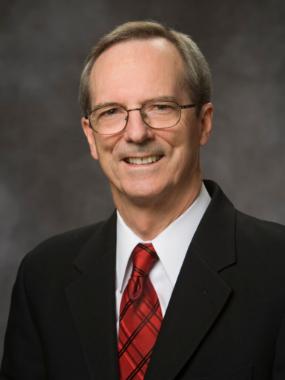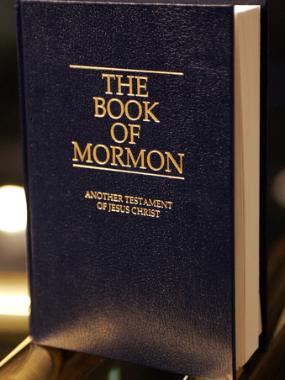| Temple Square is always beautiful in the springtime. Gardeners work to prepare the ground for General Conference. © 2012 Intellectual Reserve, Inc. All rights reserved. | 1 / 2 |
This story appears here courtesy of TheChurchNews.com. It is not for use by other media.
By Tad R. Callister
Once we know that Christ suffered for our sins so that we might repent, and that He died on the cross so that we might be resurrected, we can accept the natural sequel of that knowledge, namely, that He is our Savior and Redeemer.

Callister-4.jpg
Tad R. Callister2021 by Intellectual Reserve, Inc. All rights reserved.We may not understand why He chose Judas — who later proved to be a thief and traitor — to be an Apostle. We may not understand why He selected Peter — who in a fit of anger cut off the ear of the high priest’s servant — to be His chief Apostle. And we may not understand why he initially commanded His Apostles not to preach the gospel to the Gentiles, but we do know there must be a reasonable answer to each of those questions. Why? Because we have now crossed the bridge of doubt and accepted Jesus as our Savior and Redeemer, and therefore we know He is the perfect embodiment of all truth.
In like manner, once we know the Book of Mormon is the word of God, then we can accept the natural sequel of that knowledge, namely, that Joseph Smith must have been a prophet of God and that through his instrumentality the true Church of Jesus Christ was restored to the earth. We may not understand all the ramifications of polygamy. We may not completely understand the translation methodology of the Book of Abraham. And we may not fully understand the reason for some variations in the multiple accounts of the First Vision, but we do know there must be a reasonable answer to each of those questions. Why? Because we have now crossed the bridge of doubt and accepted the Book of Mormon as the word of God, and therefore we accept the divine implications that flow from that truth.
The Book of Mormon is a powerful, dynamic, even compelling witness of the prophetic calling of Joseph Smith and the truth of this Church. Archaeology is proving that time is on the side of this divine book (that is, with the discovery of metal plates, cement and barley dated to Book of Mormon times — all claimed by critics in earlier days to be anachronisms). Messages such as “Men are, that they might have joy” (2 Nephi 2:25) and “When ye are in the service of your fellow beings ye are only in the service of your God” (Mosiah 2:17) have a divine ring and majesty to them. Any parent would be proud to have two or three such statements remembered by his or her posterity. How then could Joseph Smith, a young newlywed, generate scores of such memorable phrases on his own?
The doctrine contained in the Book of Mormon is not only enlightening but stunning, such as the doctrinal revelation that through the Atonement, the Savior can not only cleanse us but also perfect us (see Moroni 10:32-33). The witnesses to the Book of Mormon are a brick wall to critics — critics who have a small handful of dubious quotes stacked against an avalanche of undeniable testimonies by those men who repeatedly put their lives and reputations on the line in defense of this book. And most of all, the Spirit bears witness to every person who, with a sincere heart and real intent, seeks to know of its truthfulness (see Moroni 10:4-5).
The Book of Mormon is the rock foundation for the spiritual truth seeker. All the other issues raised by the critics are peripheral — diversions from the key question at hand, namely, is the Book of Mormon the word of God? Because if it is (and surely it is), then all the peripheral issues will resolve themselves in due time.
If we have doubts caused by looking beyond the Book of Mormon, then we are looking beyond the mark. It should be the focus of our search for truth. Either Joseph Smith personally wrote the Book of Mormon and it is a fraud, or he translated it by the gift and power of God and it is divinely inspired.

Callister-2.jpeg
The Book of Mormon. Photo by Brian Nicholson, courtesy of Church News. All rights reserved.On occasion, friends who are struggling with their testimonies ask my wife and me a question that has raised doubts in their minds. Sometimes we have a satisfactory answer and sometimes we do not. In the latter case we often reply, “We do not currently know the answer to that question, but we would like to ask you a question — do you think that Joseph Smith, at age 23, with a limited education, who could not write a coherent letter as attested to by his wife, wrote the entire Book of Mormon without any notes, in a single dictation draft in approximately 65 days — that he invented the multitude of inspiring stories in that book, that he authored the incredible doctrine found within its pages, much of which was contrary to the religious teachings of his day, that he created the legion of thought-provoking statements that hang on peoples’ walls and refrigerator doors, and that he was such a lucky guesser that archaeology keeps proving him right after the critics have derided his claims as false? Or, alternatively, do you believe he translated that book by the gift and power of God? If the latter, then Joseph was a prophet and the Church is absolutely true, and for the time being we can live with a few unanswered questions.”
The central question for our dispensation has and always will be: “Is the Book of Mormon the word of God?” Once we have answered that question, the sum of all other questions takes a distant second in importance. That is why Joseph Smith referred to the Book of Mormon as the keystone of our religion — because it is also the keystone of our personal testimonies. It is God’s intellectual, emotional and spiritual gift to all seekers of truth, a gift for which we can and should be profoundly grateful.
— Elder Tad R. Callister is an emeritus General Authority and former Sunday School general president.
Copyright 2021 Deseret News Publishing Company